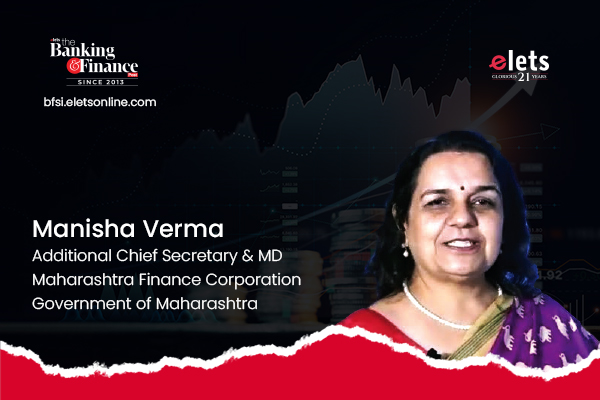At the recently concluded 5th Elets BFSI Gamechanger Summit, held from August 8-11th in Goa, Manisha Verma, Additional Chief Secretary & MD of Maharashtra Finance Corporation, delivered a compelling address on India’s financial transformation journey. Her insights painted a comprehensive picture of how the nation is leveraging technology to create a future- proof financial sector for its 1.4 billion citizens.
The digital transformation initiative in India, as elaborated by her, rests upon three fundamental pillars: the creation of comprehensive digital infrastructure, seamless delivery of digital services, and widespread digital literacy. At the heart of this transformation lies the extensive National Optic Fibre Network, which aims to connect even the remotest Gram Panchayats, ensuring that the benefits of digital banking reach every corner of the nation. This digital revolution has been further strengthened by the India Stack, a remarkable technological framework that has revolutionised how Indians interact with financial services.
Drawing from her extensive experience in public administration, she highlighted the success of this digital framework through the unprecedented adoption of the Unified Payments Interface (UPI), which processed an astounding 20 trillion worth of transactions in June alone. This achievement is complemented by other innovative solutions such as the account aggregator framework, which enables secure, consent-based sharing of financial data, and the DigiLocker system, which has simplified document verification and KYC processes for millions of Indians.
Speaking about financial inclusion, sheemphasised the impact of the Pradhan Mantri Jan Dhan Yojana, which stands as a testament to the power of combining digital infrastructure with financial inclusion goals. This innovative program has facilitated the opening of 500 million bank accounts nationwide, with women accounting for 55 percent of account holders. This massive initiative has successfully brought formal banking services to previously unbanked populations, marking a significant milestone in India’s financial inclusion journey.
She particularly emphasised the robust regulatory framework supporting this digital transformation, with institutions like the Reserve Bank of India (RBI), SEBI, and the Insurance Regulatory Authority leading the charge. She detailed how the RBI’s introduction of a regulatory sandbox in 2019 has provided fintech companies with a controlled environment to test innovations, while SEBI has embraced blockchain technology for e-voting to enhance shareholder participation.
Drawing from her experience as Principal Secretary of Tribal Affairs during the COVID-19 pandemic, Verma shared personal insights into the challenges of digital divide, particularly in educational settings where urban students easily transitioned to online learning while tribal children struggled with basic connectivity. This real-world perspective highlighted the pressing concern of digital inclusion, with internet penetration at 47 percent and approximately 700 million Indians still offline.
However, significant challenges remain on the path to complete digital financial inclusion. The digital divide remains a pressing concern, with internet penetration at 47 percent and approximately 700 million Indians still offline. This divide is particularly pronounced along gender and rural- urban lines, with women and remote communities having limited access to digital devices and internet facilities. The experience during the COVID-19 pandemic highlighted these disparities, especially in educational settings where urban students easily transitioned to online learning while tribal children struggled with basic connectivity.
Also Read | The Digital Revolution in NBFCs: Transforming Compliance, Cybersecurity, and CX
Data privacy and cybersecurity represent another critical challenge. The rising incidents of cyber fraud and unauthorised data access underscore the need for robust security frameworks. The Personal Data Protection Bill 2023 aims to address these concerns, but balancing innovation with individual rights remains a complex challenge. The regulatory framework must evolve to keep pace with technological advancements while ensuring consumer protection without stifling innovation.
Looking ahead, India’s path to a future-proof financial sector requires sustained investment in digital infrastructure, particularly in extending high- speed internet connectivity to every village. The establishment of fintech innovation hubs in major cities, creation of state-level regulatory sandboxes, and international collaboration with advanced fintech nations like Singapore, UK, and Japan will be crucial. Moreover, prioritising financial literacy in educational curricula and embracing sustainable finance through frameworks for green bonds and ESG risk assessment will be essential components of this journey.
Elets The Banking and Finance Post Magazine has carved out a niche for itself in the crowded market with exclusive & unique content. Get in-depth insights on trend-setting innovations & transformation in the BFSI sector. Best offers for Print + Digital issues! Subscribe here➔ www.eletsonline.com/subscription/




















